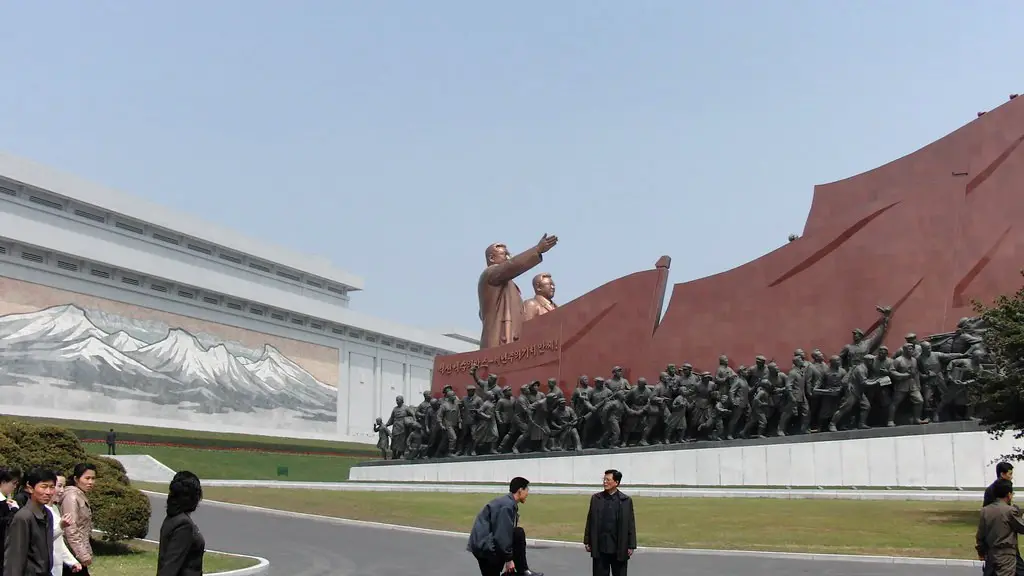Political Exploitation of Domestic Population
North Korea is an isolated nation that has been ruled for most of its history by a single family. Even though it was once a satellite of the Soviet Union and a major player in the Cold War, it has remained one of the most authoritarian regimes in the world. Under the rule of the Kim family, North Korea’s nationhood has been maintained through a combination of militaristic propaganda, extreme control over the population, and a heavy reliance on arms exports. Despite its promises to improve the quality of life for its citizens, the North Korean government has also become adept at exploiting public opinion through propagandistic images of their leader, Kim Jong Un.
From the perspective of international relations, the North Korean leadership seeks to maintain itself as a powerful and influential actor in the geopolitical landscape. Recently, Kim Jong Un has become increasingly unpredictable and aggressive, issuing threats to various other countries such as the United States and South Korea. While part of this belligerence no doubt serves to frighten other nations, it also serves to further consolidate the domestic population behind the rule of the Kim family.
Economic Exigency
The economic situation in North Korea is dire, with a dysfunctional economy based on state-run businesses and failed attempts at market reform. These problems have been compounded by international sanctions, leading to a depleted foreign currency reserves and dramatically worsening poverty. The North Korean government has been unable to satisfy the needs of its people and has resorted to using the country’s military prowess and threats of war to extort resources from other nations.
Nonetheless, North Korea’s leadership is aware that an armed conflict with another country would be terribly costly and could potentially destabilize the regime. Therefore, despite all the aggressive posturing, North Korea is unlikely to start a war with its neighbor to the south.
Rhetoric instead of Action
North Korea’s military might is formidable and the regime could unleash a significant amount of destruction if it chose to attack the South. However, this means little if the North Korean leadership realizes the significant consequences such an attack would have on its nation and the world at large. Kim Jong Un has likely concluded that issuing belligerent statements and threats is a much less costly and more effective way to maintain domestic support and international loyalty.
The reality is that North Korea can’t wage a successful military campaign against South Korea without significantly risking its own regional influence and military capabilities. For North Korea, the cost of an armed conflict would be substantially higher than the potential benefit. As a result, North Korea is far more likely to continue its bellicose rhetoric and menacing threats than to launch an all-out war against South Korea.
Damage to North Korean Reputation
In order to remain a viable regional player, North Korea needs to maintain a certain level of international legitimacy. If it were to launch an openly aggressive attack against the South, this reputation would be forever tarnished. North Korea is desperately seeking the attention and recognition of the international community, and it realizes that a military conflict with South Korea would alienate it even further.
Another important reason why North Korea will not attack South Korea is that an armed conflict could potentially draw in the United States and other countries in the region. The US already maintains a significant military presence in South Korea and US President Donald Trump has made it clear that any attack on the South would be met with an overwhelming response. As a result, the North Korean leadership has no incentive to start a war that it cannot win.
Containment Policies
Rather than engage in a war with South Korea, the North Korean regime has actively sought to contain and control its nuclear weapons. This includes its recent efforts to establish a more cooperative relationship with South Korea and the United States. North Korea has also been granted relief from some of the international sanctions which had previously imposed on it.
These efforts have been met with some success, as the United States and South Korea have both adopted a “diplomatic engagement” policy with North Korea. This entails greater dialogue and the provision of humanitarian aid, in exchange for concessions from the North Korean government. The US and South Korea have also suspended their joint military exercises near the North Korean border.
Mutual Benefit
North Korea is acutely aware of the benefits that can be gained from a peaceful coexistence with South Korea. Even though a war of any kind is highly undesirable from North Korea’s perspective, the benefits of improved bilateral relations are much more appealing. The North Korean leadership can gain concessions from the South by engaging in dialogue and cooperation, without sacrificing its domestic political and military strength.
North Korea is also mindful of the potential for international condemnation if it chooses to resort to military aggression. Kim Jong Un understands that no matter how much military strength he has at his disposal, an attack on South Korea would likely backfire. As a result, North Korea is likely to continue its current path of diplomatic engagement with its neighbor in order to maximize its own strategic interests.
Increasing Diplomatic Activity
The recent meetings between the United States and North Korea are indicative of the direction that this situation is likely to take. The US is emphasizing the prospects of economic development and closer international relations, while North Korea is maintaining its commitment to denuclearization.
Both countries are also engaging in increasing levels of communication, both publicly and privately, and North Korea is signaling its willingness to engage in more open dialogue and collaboration. This dialogue is essential for a more stable and secure region, and it is telling of North Korea’s commitment to remaining peaceful and cooperative.
Prospects for Peaceful Unification
At present, North Korea is in a unique and nearly unprecedented situation. The North Korean economy is in shambles and its international legitimacy is fragile at best. Despite the aggressive posturing of its leader, North Korea is unlikely to initiate a military conflict with South Korea.
As both countries explore diplomatic solutions to the current impasse, there is a glimmer of optimism that the two Koreas could ultimately reunite peacefully. It is clear that both countries stand to gain if they move towards a more cooperative relationship. If both sides continue to move towards a constructive collaboration, then perhaps the prospect of peaceful unification is not just a distant dream.


